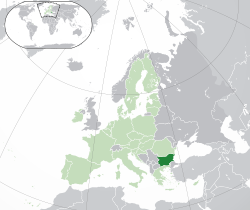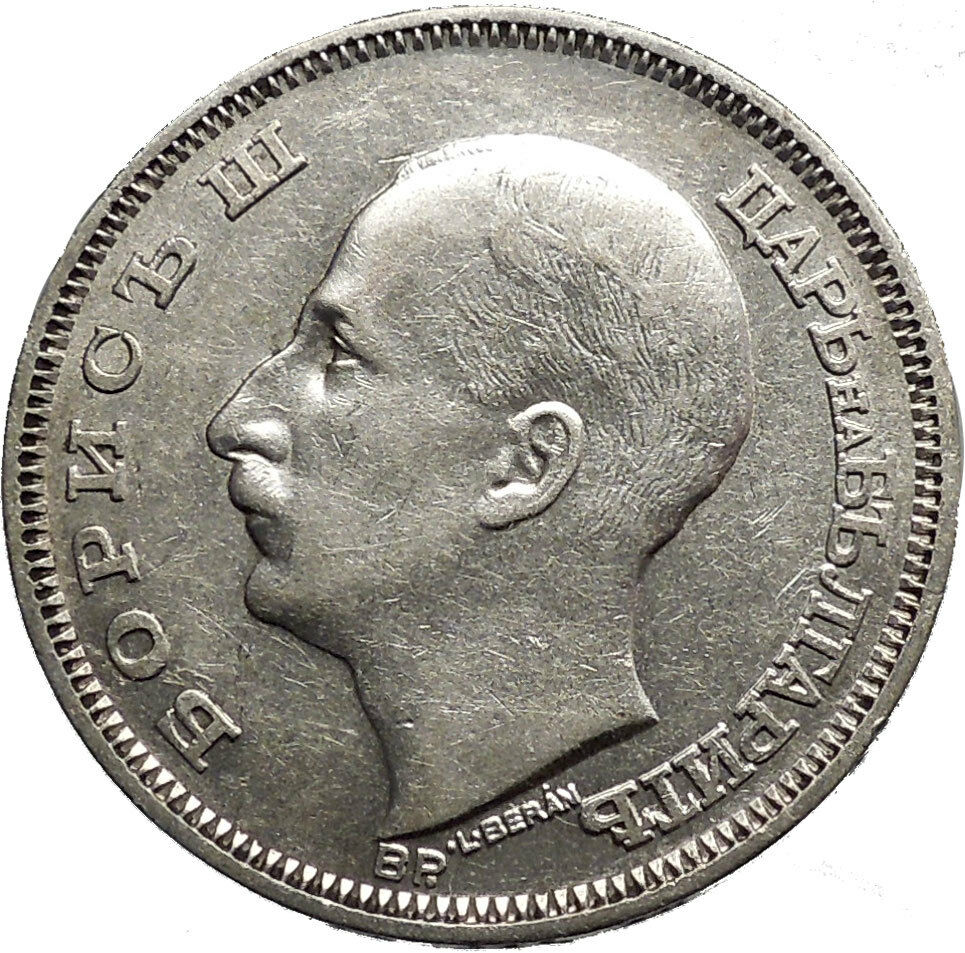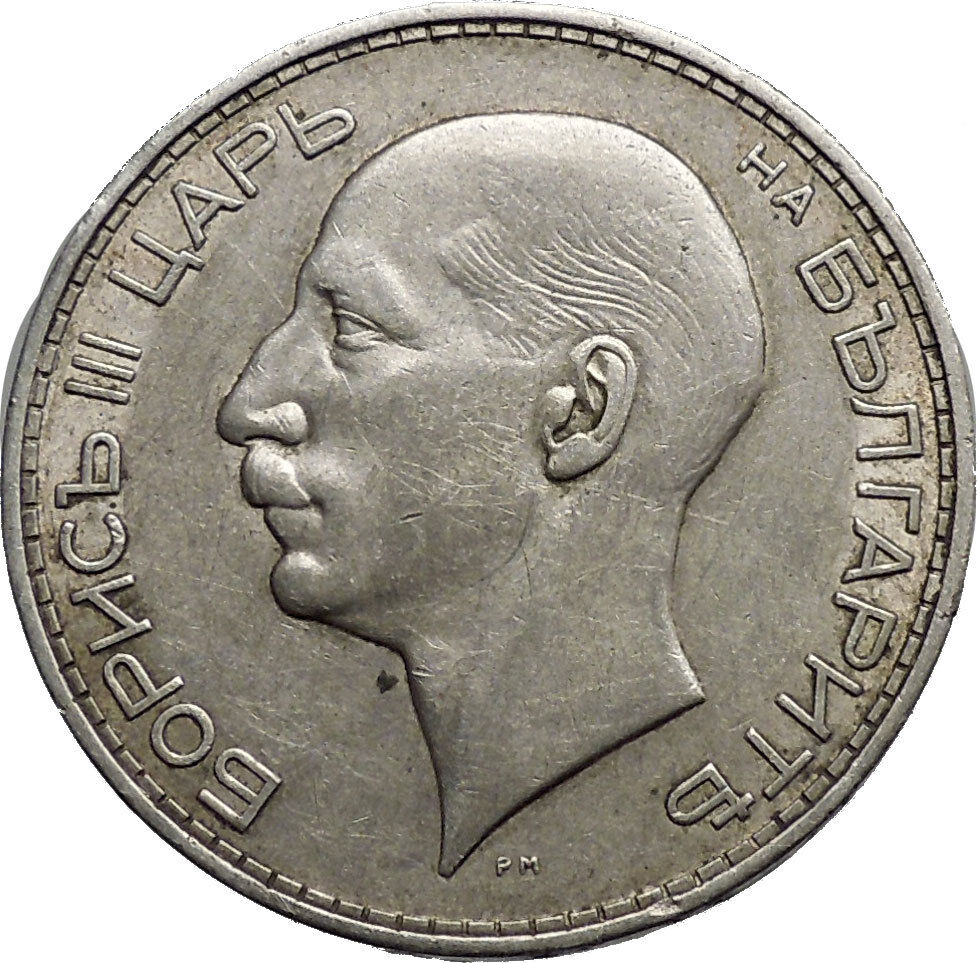|
Bulgaria
100th Anniversary of Birth of Georgi Dimitrov
1982 Proof Silver 25 Leva 32mm (13.60 grams) 0.500 Silver (0.2251 oz. ASW)
Reference: KM# 145 | Engravers: Lyubomir Prahov, Petar Braikov
НАРОДНА РЕПУБЛИКА БЪЛГАРИЯ 1982 * 25 ЛЕВА *, Coat-of-arms of People’s Republic
of Bulgaria.
★ГЕОРГИ ДИМИТРОВ 1882★1982, Portrait of Georgi Dimitrov left, two dates lower
right.
You are bidding on the exact item pictured, provided with a Certificate of Authenticity and Lifetime Guarantee of Authenticity.
 Georgi Dimitrov Mihaylov (Bulgarian: Гео̀рги Димитро̀в Миха̀йлов), also known as Georgiy Mihaylovich Dimitrov (Russian: Гео́ргий Миха́йлович Дими́тров; 18 June 1882 – 2 July 1949), was a Bulgarian communist politician. He was the first communist leader of Bulgaria from 1946 to 1949. Dimitrov led the Communist International from 1935 to 1943. Georgi Dimitrov Mihaylov (Bulgarian: Гео̀рги Димитро̀в Миха̀йлов), also known as Georgiy Mihaylovich Dimitrov (Russian: Гео́ргий Миха́йлович Дими́тров; 18 June 1882 – 2 July 1949), was a Bulgarian communist politician. He was the first communist leader of Bulgaria from 1946 to 1949. Dimitrov led the Communist International from 1935 to 1943.
Dimitrov joined the Bulgarian Social Democratic Workers’ Party in 1902, and in 1903 followed Dimitar Blagoev and his wing, as it formed the Social Democratic Labour Party of Bulgaria (“The Narrow Party”, or tesniaks). This party became the Bulgarian Communist Party in 1919, when it affiliated to Bolshevism and the Comintern. From 1904 to 1923, he was Secretary of the General Trade Unions Federation, which the Narrows controlled. In 1911, he spent a month in prison for libeling an official of the rival Free Federation of Trade Unions, whom he accused of strike breaking. In 1915 (during World War I) he was elected to the Bulgarian Parliament and opposed the voting of a new war credit. In summer 1917, after he intervened in defence of wounded soldiers who were being ordered by an officer to clear out of a first class railway carriage, he was charged with ‘incitement to mutiny, stripped of his parliamentary immunity and was imprisoned on 29 August 1918. Released in 1919, he went underground, and made two failed attempts to visit Russia, finally reaching Moscow in February 1921. He returned to Bulgaria later in 1921 but returned to Moscow and was elected in December 1922 to the executive of Profintern, the communist trade union international.
In June 1923, when Prime Minister Aleksandar Stamboliyski was deposed through a coup d’état, Dimitrov and Khristo Kabakchiev, the leading communists in Bulgaria at that time, resolved not to take sides, a decision condemned by Comintern as a “political capitulation” brought on by the party’s “dogmatic-doctrinaire approach”. After Vasil Kolarov had been sent from Moscow to impose a change in the party line, Dimitrov accepted Comintern’s authority, and in September 1923 led, alongside Kolarov, the failed uprising, against the regime of against Aleksandar Tsankov, which cost the lives of possibly five thousand communist supporters during the fighting and the reprisals that followed. Despite its failure, the attempt was approved by Comintern, and secured the positions of Kolarov and Dimitrov – who escaped via Yugoslavia to Vienna – as the joint leaders of the Bulgarian CP. In the aftermath the St Nedelya Church, a terrorist bomb attack carried out by communists, Dimitrov was tried in absentia in May 1926 and sentenced to death, although he had not approved the attack, and his only surviving brother, Todor, was arrested and killed by royal police in 1925. Under pseudonyms, he lived in the Soviet Union until 1929, when he was ousted from his leadership role in the Bulgarian communist party by a faction of younger, more left wing activists, and was relocated to Germany, where he was given charge of the Central European section of the Comintern. In 1932, Dimitrov was appointed Secretary General of the World Committee Against War and Fascism, replacing Willi Münzenberg.
 Bulgaria (Bulgarian: България, tr. Bǎlgariya), officially the Republic of Bulgaria (Bulgarian: Република България, tr. Republika Bǎlgariya, IPA: [rɛˈpublikɐ bɐɫˈɡarijɐ]), is a country in southeastern Europe. It is bordered by Romania to the north, Serbia and Macedonia to the west, Greece and Turkey to the south, and the Black Sea to the east. With a territory of 110,994 square kilometres (42,855 sq mi), Bulgaria is Europe’s 16th-largest country. Bulgaria (Bulgarian: България, tr. Bǎlgariya), officially the Republic of Bulgaria (Bulgarian: Република България, tr. Republika Bǎlgariya, IPA: [rɛˈpublikɐ bɐɫˈɡarijɐ]), is a country in southeastern Europe. It is bordered by Romania to the north, Serbia and Macedonia to the west, Greece and Turkey to the south, and the Black Sea to the east. With a territory of 110,994 square kilometres (42,855 sq mi), Bulgaria is Europe’s 16th-largest country.
 Organised prehistoric cultures began developing on current Bulgarian lands during the Neolithic period. Its ancient history saw the presence of the Thracians, Ancient Greeks, Persians, Celts, Romans, Goths, Alans and Huns. The emergence of a unified Bulgarian state dates back to the establishment of the First Bulgarian Empire in 681 AD, which dominated most of the Balkans and functioned as a cultural hub for Slavs during the Middle Ages. With the downfall of the Second Bulgarian Empire in 1396, its territories came under Ottoman rule for nearly five centuries. The Russo-Turkish War of 1877-78 led to the formation of the Third Bulgarian State. The following years saw several conflicts with its neighbours, which prompted Bulgaria to align with Germany in both world wars. In 1946 it became a one-party socialist state as part of the Soviet-led Eastern Bloc. In December 1989 the ruling Communist Party allowed multi-party elections, which subsequently led to Bulgaria’s transition into a democracy and a market-based economy. Organised prehistoric cultures began developing on current Bulgarian lands during the Neolithic period. Its ancient history saw the presence of the Thracians, Ancient Greeks, Persians, Celts, Romans, Goths, Alans and Huns. The emergence of a unified Bulgarian state dates back to the establishment of the First Bulgarian Empire in 681 AD, which dominated most of the Balkans and functioned as a cultural hub for Slavs during the Middle Ages. With the downfall of the Second Bulgarian Empire in 1396, its territories came under Ottoman rule for nearly five centuries. The Russo-Turkish War of 1877-78 led to the formation of the Third Bulgarian State. The following years saw several conflicts with its neighbours, which prompted Bulgaria to align with Germany in both world wars. In 1946 it became a one-party socialist state as part of the Soviet-led Eastern Bloc. In December 1989 the ruling Communist Party allowed multi-party elections, which subsequently led to Bulgaria’s transition into a democracy and a market-based economy.

Bulgaria’s population of 7.2 million people is predominantly urbanised and mainly concentrated in the administrative centres of its 28 provinces. Most commercial and cultural activities are centred on the capital and largest city, Sofia. The strongest sectors of the economy are heavy industry, power engineering, and agriculture, all of which rely on local natural resources.
The country’s current political structure dates to the adoption of a democratic constitution in 1991. Bulgaria is a unitary parliamentary republic with a high degree of political, administrative, and economic centralisation. It is a member of the European Union, NATO, and the Council of Europe; a founding state of the Organization for Security and Co-operation in Europe (OSCE); and has taken a seat at the UN Security Council three times.
|





 Georgi Dimitrov Mihaylov (Bulgarian: Гео̀рги Димитро̀в Миха̀йлов), also known as Georgiy Mihaylovich Dimitrov (Russian: Гео́ргий Миха́йлович Дими́тров; 18 June 1882 – 2 July 1949), was a Bulgarian communist politician. He was the first communist leader of Bulgaria from 1946 to 1949. Dimitrov led the Communist International from 1935 to 1943.
Georgi Dimitrov Mihaylov (Bulgarian: Гео̀рги Димитро̀в Миха̀йлов), also known as Georgiy Mihaylovich Dimitrov (Russian: Гео́ргий Миха́йлович Дими́тров; 18 June 1882 – 2 July 1949), was a Bulgarian communist politician. He was the first communist leader of Bulgaria from 1946 to 1949. Dimitrov led the Communist International from 1935 to 1943. Bulgaria (Bulgarian: България, tr. Bǎlgariya), officially the Republic of Bulgaria (Bulgarian: Република България, tr. Republika Bǎlgariya, IPA: [rɛˈpublikɐ bɐɫˈɡarijɐ]), is a country in southeastern Europe. It is bordered by Romania to the north, Serbia and Macedonia to the west, Greece and Turkey to the south, and the Black Sea to the east. With a territory of 110,994 square kilometres (42,855 sq mi), Bulgaria is Europe’s 16th-largest country.
Bulgaria (Bulgarian: България, tr. Bǎlgariya), officially the Republic of Bulgaria (Bulgarian: Република България, tr. Republika Bǎlgariya, IPA: [rɛˈpublikɐ bɐɫˈɡarijɐ]), is a country in southeastern Europe. It is bordered by Romania to the north, Serbia and Macedonia to the west, Greece and Turkey to the south, and the Black Sea to the east. With a territory of 110,994 square kilometres (42,855 sq mi), Bulgaria is Europe’s 16th-largest country. Organised prehistoric cultures began developing on current Bulgarian lands during the Neolithic period. Its ancient history saw the presence of the Thracians, Ancient Greeks, Persians, Celts, Romans, Goths, Alans and Huns. The emergence of a unified Bulgarian state dates back to the establishment of the First Bulgarian Empire in 681 AD, which dominated most of the Balkans and functioned as a cultural hub for Slavs during the Middle Ages. With the downfall of the Second Bulgarian Empire in 1396, its territories came under Ottoman rule for nearly five centuries. The Russo-Turkish War of 1877-78 led to the formation of the Third Bulgarian State. The following years saw several conflicts with its neighbours, which prompted Bulgaria to align with Germany in both world wars. In 1946 it became a one-party socialist state as part of the Soviet-led Eastern Bloc. In December 1989 the ruling Communist Party allowed multi-party elections, which subsequently led to Bulgaria’s transition into a democracy and a market-based economy.
Organised prehistoric cultures began developing on current Bulgarian lands during the Neolithic period. Its ancient history saw the presence of the Thracians, Ancient Greeks, Persians, Celts, Romans, Goths, Alans and Huns. The emergence of a unified Bulgarian state dates back to the establishment of the First Bulgarian Empire in 681 AD, which dominated most of the Balkans and functioned as a cultural hub for Slavs during the Middle Ages. With the downfall of the Second Bulgarian Empire in 1396, its territories came under Ottoman rule for nearly five centuries. The Russo-Turkish War of 1877-78 led to the formation of the Third Bulgarian State. The following years saw several conflicts with its neighbours, which prompted Bulgaria to align with Germany in both world wars. In 1946 it became a one-party socialist state as part of the Soviet-led Eastern Bloc. In December 1989 the ruling Communist Party allowed multi-party elections, which subsequently led to Bulgaria’s transition into a democracy and a market-based economy.





